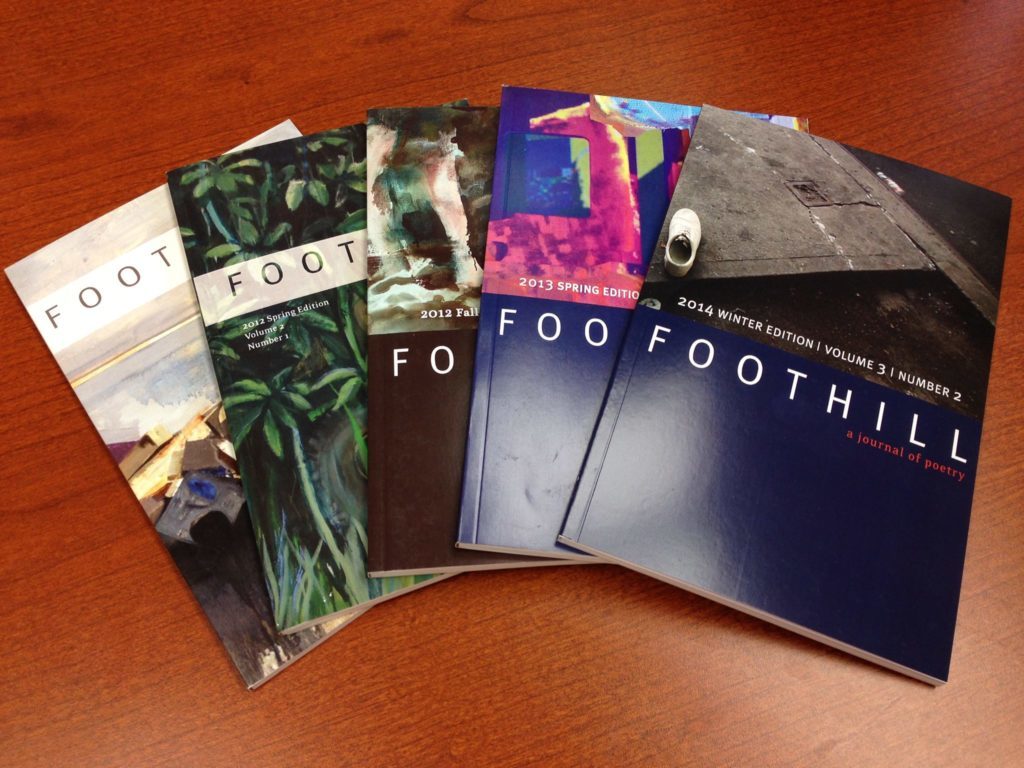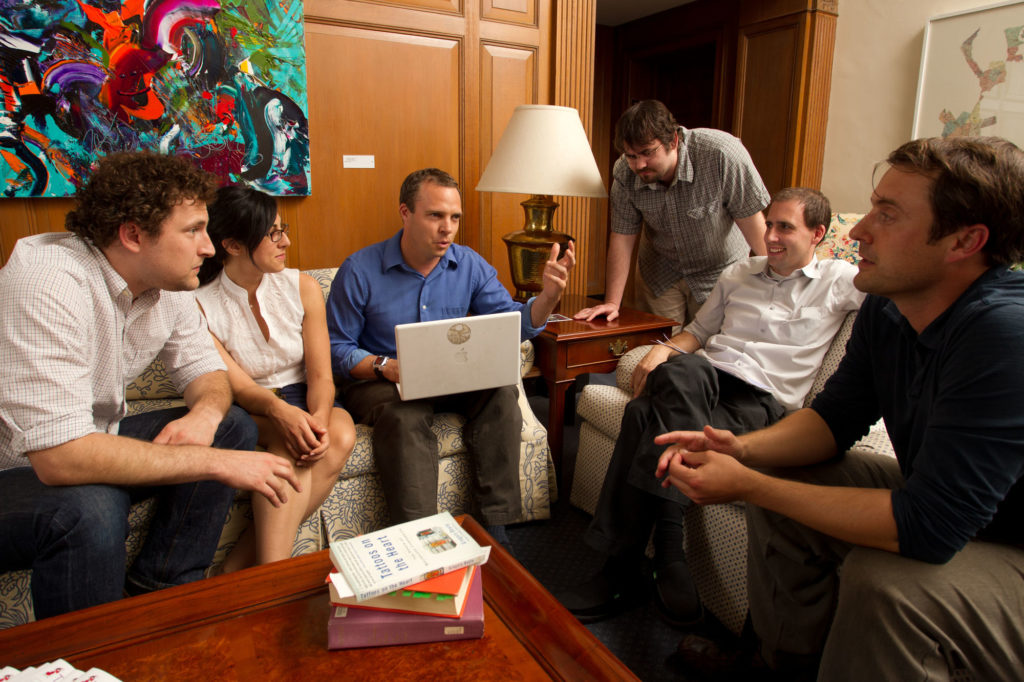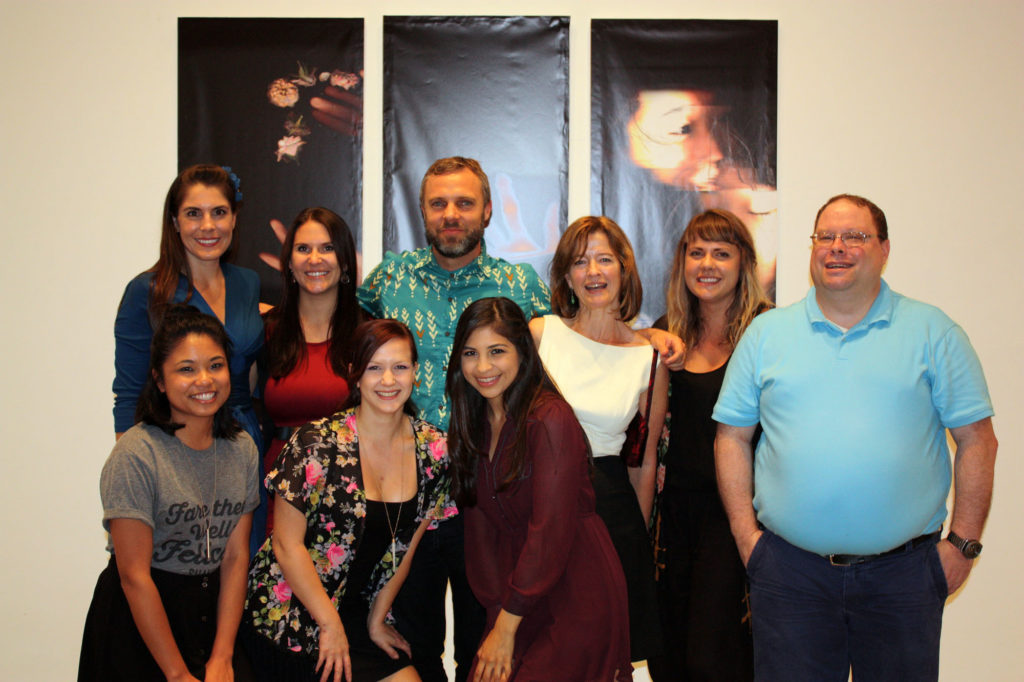The Foothill Journal: Huddled Around the Table for Poetry

On a recent unseasonably chilly night in Claremont, my fellow Tufts blogger Ashley Call and I met up with Kevin Riel, editor-in-chief of Claremont Graduate University’s Foothill poetry journal. Though each of us had recently become fledgling Foothill editors, Ashley and I wanted to find out more information about this tremendous poetic project and knew that Kevin would be the perfect source. So over a few rounds of drinks and bouts of collegial laughter, we discussed the publication’s history, importance, and future direction.
Brock: So, Kevin, how did this whole Foothill thing get started?
Kevin: All I heard was ‘Kevin, get in here’ and I found myself suddenly pitching this idea.
The anecdotal backstory: In 2010, while acting as a student intern for CGU’s Office of Marketing and Communications, Kevin and a coworker spent hours collectively daydreaming about starting a university-sponsored poetry magazine. So when Professor Wendy Martin, who had just become the director of the Tufts Awards, came into their office looking for ideas for activities that could bridge the Tufts Awards with the CGU community, Kevin’s boss knew exactly where to turn.
Ashley: Wow. Just right then and there?
Kevin: Just right then and there. The day before I had no idea I would ever be involved in a literary magazine and the next day I had this huge responsibility.
As we gathered together against the cool wind on the back patio of a local pub at our corner table, stoically ignoring the broken heat lamps, Kevin referenced another table from an earlier time when discussing the journal’s humble origins.
Kevin: In the early days, a group of fellow students gathered over a couple of six packs and bottles of wine and packs of cigarettes, actually at my dining room table, and we just started talking. There were a lot of lit journals that we admired and we were kind of overwhelmed with the idea of stepping into that arena…So we thought, wouldn’t it be interesting if we did something a little bit different. It occurred to us that we were students at a university that is a little different, maybe we should be a journal that only publishes graduate students.

Kevin continued on to stress that Foothill is the only journal that solely publishes the work of graduate students, which necessarily involves engaging with several important questions: “How do we think about this literary community? What binds it? What menaces it? Debt, under-acknowledgment, privilege, etc.? How can we assist this community? How can we make it more aware of itself, strengthen it?” After several rejected possible names, the collective of graduate student volunteers settled on Foothill for two reasons. The first and most obvious is a nod to CGU’s location, nestled just south of old Route 66, Foothill Boulevard. But there is also a metaphoric meaning to the journal’s moniker: “These are poets who are at the beginning of their career in the apprentice stage who haven’t yet, generally speaking, moved into the professional sphere but in many cases are one step away from making that next step,” Kevin explained. Foothill aims to provide a needed stepping-stone as these creators climb to new artistic pinnacles: “These poets, they’re innovative and take risks and, yeah, sometimes a little rough around the edges, but there is enough there to celebrate, though maybe not enough for the high-circulation journals that like well-wrought urns. We thought we could rescue some of these really good, forward-thinking submissions from the slush piles and give them an audience of like-situated poets.”
Brock: What are some of the challenges you have encountered while working as Foothill’s main editor?
Kevin: One of the most difficult things about being a poetry editor is cultivating a generosity of aesthetics, a wideness of appetite, amid what is a really decentralized contemporary poetry scene, or actually series of poetry scenes. There are so many factions, schools, counter-movements, cross-pollinations, etc. it is really hard to get your arms around it. In the old days, there were kingmakers, critics who sat upon the mountaintop and said ‘This poet is important, this poet is important.’ And now there’s so much up for grabs, so much diffusion and possibility that it’s really a wild west. And in order to be fair to the range of poems we get it, we really have to read a lot of (and about) contemporary poetry and stretch our imaginations…every poem is trying to communicate to you the way in which it is trying to be successful and you sort of have to be fluid and flexible and hope that you get it right.
Brock: From its humble beginnings around your dining room table, Foothill continues to gain steam and recognition. How have you seen the journal change over the years since its almost accidental beginning?
Kevin: We haven’t changed much from the first issue. I think we’ve gotten smarter about the debates that are circling the poetry world, and thus better at spotting talent. Each of us, paradoxically, are a little more entrenched but also have a stronger negative capability; we can kind of surrender our own personal tastes and accept a more generous vision for what moving, outstanding poetry can be. But, we’re still a ragtag group of graduate students who are just trying to make our deadlines and [balance] everything else in life…We’re late on things all the time, which is very graduate student-esque.
Another important constant in Foothill’s history is a continued effort toward inclusion despite its ever-evolving editorial board. Kevin explained, “Every year we bring on new people but I think the spirit of open-mindedness is one that we’ve kept at the core and that helps guide us.” One interesting addition has been the increased involvement of graduate students without any formal background in poetry: “They see things that we don’t see and they cause us to self-exam and question.”
This questioning and self-examination are routinely evident during Foothill’s weekly editorial meetings. Imagine a group of graduate students huddled around a campus conference table, hashing over the ins and outs of poetic merit while hovering over Trader Joe’s cheese and cracker spreads, sipping wine and beer in between often-explosive discussions. The strength and ingenuity of stellar poems are lauded; the shortcomings of otherwise compelling work are detailed. On-the-fence submissions are saved or discarded, participants’ opinions either shifting or failing to be swayed by shared insights. It is an exhilarating event to behold, full of passionate pleas and critical observations, these sessions of poetic argument and discovery orchestrated completely by graduate students on behalf of graduate student verse.
Ashley: Are there certain challenges that a graduate-student-only publication faces with which a regular poetry journal does not have to contend?
Kevin: You want to be very selective, and we are very selective, but sometimes we have to beat the bushes more than most established journals to get our submission counts up so we can be selective. We’re constantly reaching out to programs in the US and around the world. We’re having to do less of that than we used to, we are a little bit more a part of the culture, the scene, but still we have to do a lot of outreach. There were some issues where we looked through 1200 poems, others we considered only 500, 400…We’ve had lean and busy years, [but] generally speaking we publish about 3 – 4% of the submissions that we get. That stays about the same. Somehow, magically, we always manage, by the end of our deadline, to hit that twenty-poems-or-so threshold. So it always works out that we have enough poems at the end of our reading period.
Part of this “magic” might be due to the wide diversity of graduate student submissions Foothill seeks out and receives. Though a majority of submitted poems come from MFA students, Kevin underscores that the journal routinely receives work from students in medical schools, law, and vocational schools, and “we love that. It’s so much fun to open up a submission from someone who is in a farm science program…when it’s good, it’s like hitting a vein of gold, it’s a rewarding and exciting discovery.” Casting such a wide net for graduate work, Foothill is able to adequately tap into various graduate student mindsets: “Through the work that we do, certain themes are going to rise to the surface because these are part of the anxieties and concerns and interests of the demographic we publish.” One of these themes is military service and “we try to showcase that work.” Noting that especially during the past year the journal received a substantial amount of veteran submissions, Kevin added, “We hope that we can get more veterans to send us poems…They’ve got really important things to say.” Another significant theme “is student debt, which is a crucial political issue right now. We publish, almost every issue, a poem about student debt.”
Brock: You have an issue about to come out, right? How is the forthcoming installment coming along?
Kevin: We have a new issue coming out in October…It’s going to be an amazing issue. I’ve been rereading through the poems. They’re incredible, from all order of grad programs; Ivy Leagues, state schools, and everything in between. In addition to its arresting content, Kevin is also excited about the issue’s unquestionable beauty: The art is always from CGU students…and it makes the journal a beautiful object. When we started, if we can go back quickly to our table discussion in my kitchen, we thought we’re not going to do this unless we can do it beautifully. We want to match the dedication of the poets in the journal with a thoughtful, beautifully realized physical and digital object.
Kevin shared details for the upcoming art gallery and poetry reading event at CGU to commemorate both the current Kingsley Tufts winner, Ross Gay, to highlight the artwork of CGU students, and to showcase Foothill’s latest edition and published poets. One of many events during Gay’s week-in-residence at CGU, the poetry and art show will be held on Friday, October 7th, in CGU’s Peggy Phelps and East Galleries at 6 pm. All members of the community are welcome to come view inspiring artworks, listen to poetry readings from a Tufts winner and a Foothill poet, all while nibbling hors d’oeuvres and imbibing spirits. According to Kevin, “October 7th is important because it’s where we publicly join hands with the Tufts Awards and CGU’s Art department and put on a big show.”
As our lengthy discussion started coming to a close, the ever-increasing chill in the wind encouraging our looming departure, Ashley, Kevin and I contemplated the future of Foothill.
Brock: Foothill has benefitted from your elongated tenure in graduate school, where most graduate-run journals might face complete turn-over every two to four years. As your time as a graduate student is coming to a close, what are your hopes for this project of which you have been such an instrumental part?

Kevin: I hope it lives a long life because we put so much time and effort into it that it would be heartbreaking if it didn’t live on beyond my tenure as a graduate student. I think that it will.” After a few more moments of introspection, he elaborated, “My hope is that it becomes further ensconced in the work of the English department, my hope is that the program gravitates toward contemporary poetry as a scholarly interest and that the journal becomes a part of that conversation. It is a huge education to be asked to curate literary production as it’s happening because the responsibility you feel is enormous and in order to meet that responsibility you necessarily have to start reading a lot of contemporary work and our editors always do…It’s a tremendous opportunity for students and I hope it continues and is brought further into the orbit of the work of the university.
Brock: So, I’m a graduate student at CGU and I hear about Foothill. How do I go about getting involved?
Kevin: Just reach out. Email me. We’ll sit down, have a beer, talk about contemporary poetry, how much time you can commit and see if it’s a good fit for you.
As we gathered our belongings, drained our last drinks, and took care of the check, Ashley and I tried to thank Kevin for all of his hard work on Foothill from its beginning stages to its current state. But he humbly shrugged his shoulders before heading off into the blistery evening. “There’s an army of people who have been involved in all different aspects since the early days up until today who have been so generous with their time and deserve thanks. So many people have made it happen. I’ve been around through the whole stint of it, but it has always been very much a team effort,” he emphasized.
Walking away from our corner section of the restaurant’s porch, I looked back at our now-empty tabletop covered with empty glasses and discarded napkins, the only physical evidence of our poetic discussion. And I realized that around this table there had been a lot of talk about tables – from Kevin’s dining room table where Foothill was born to the several years of editorial debates held around campus conference tables. It felt like now, with tonight’s interview, we had somehow come full circle. And imagining Foothill’s future, I could see a long line of other scenes where graduate students continued to gather around additional tables, all for the sake of poetry.
—Brock Rustin
Share